#I love the rhythm
Note
Do yoy like their silly little dance
the inside of my brain at any given moment:

#twisted wonderland#twisted wonderland spoilers#stage in playful land#stage in playfulland#gif warning#gifs that bop along to your music warning#gidel is SO little#look at him compared to everyone else!#three apples tall!#i could put him in my pocket and still have space to pack him a lunch#this rhythmic is so silly. i love when we get a cutesy upbeat rhythmic right before everything goes straight to shit.#fellow and gidel: (dance around all cutely and throw confetti)#fellow and gidel: anyway now it's time to sell you#just the most adorable little kidnappers 🩷#so glad they made an official gidel chibi because otherwise i would have tried to and it would not have ended well#i'm trying to do a meleanor right now and she is giving me enough trouble. she doesn't even have any STRIPES.#do you think the riggers got handed the designs for this event with all the stripes and swirlies and patches and patterns#and just had to go stare at a wall for an hour or two#'okay look people are going to see this on a small screen with a rhythm game going on in the foreground'#'nobody is going to take a high-res screen recording and then go through it frame-by-frame to scrutinize our rigging breakdowns'#'what kind of HUGE NERD do you think plays this stupid game'#(shifty eyes)
1K notes
·
View notes
Text
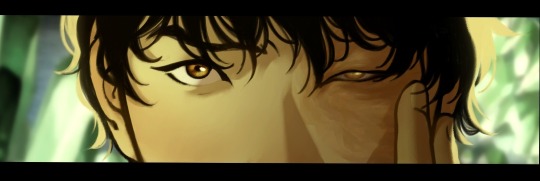
Almost
#zutara#atla#zuko#avatar the last airbender#katara#zutara fanart#Wip#First page of three is done!!!#Won't be sharing until I have the whole thing but I'm. So. Close!!!!!!!#It's been ages since I started this project omg#But it's worth it#Hopefully I'll get the chance to finish it tomorrow... Won't be making any promises tho#I've missed you guys and I can't wait to share this with you#Anyways I know it's ZK month (and all the content has been WONDERFUL so far) but I won't be participating. Sorry about that.#Working with prompts is such an amazing creative exercise but I know myself good enough to be certain that I'll never get past the first...#... prompt without coming up with seven different AUs and I can't deal with more of those right now lol#Like I've got this Blue Spirit! Katara and Painted Lady! Zuko AU on the works since last week or so. And more lore for the og BS/PL spirits#And also this S3 canon divergence AU... And another one... And another one...#And I need to work on them at my own rhythm otherwise I'll go nuts#So uh#Yeah#Love u all and I hope I'll get to share this one soon (if only to start on yet another comic. I've got ideas for two of them. Yay)#Dema out#(Sorry for the rambling I'm just anxious)#(Don't know why but I stopped caring a long time ago)
620 notes
·
View notes
Text
okay wait im about to go to bed but i want to know.
#my fave is the shield because i love being behind my 7 proxies#my least favorite is the gun because i get never get the rhythm of reloading down right
1K notes
·
View notes
Text

Here's a dance you ought to do
Let me introduce to you
Posin'
everybody POSE!
#star wars#jedi au maul#jedi au#maul#darth maul#fan art#he likes to break into dance parties because dancing is good for developing rhythm and agility#obviously#i love you youngling trainer maul#younglings belong to friends
959 notes
·
View notes
Text
The argument that Moash was the only one in Bridge Four that didn't see Kaladin as some kind of deity or hero really falls apart once you get to the Bridge Four POV chapters in Oathbringer. They're like "yeah, Kaladin is great, but sometimes he can be an idiot, you know" and things of the sort.
Meanwhile, in Oathbringer and Rhythm of War Moash's POVs actually show that he paints Kaladin as this perfect man and soldier.
#i will keep believing that moash was never truely kaladin's friend#the energy that the people on this website put into loving moash#should instead go into loving rock or teft or lopen or sigzil#at least they actually deserve it#and they were actually kaladin's friends#stormlight archive#brandon sanderson#kaladin stormblessed#moash#oathbringer#rhythm of war spoilers#rhythm of war
410 notes
·
View notes
Text
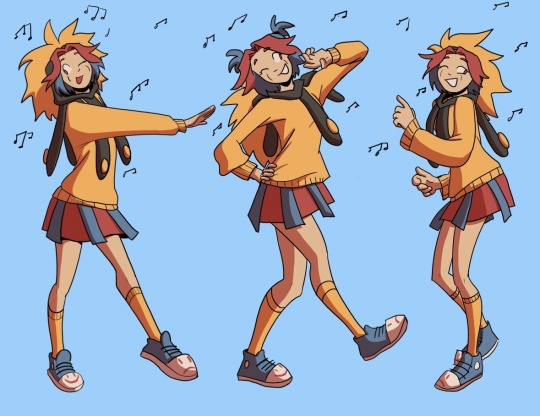
dancin anzus 🎶🎶🎶
#shes so silly#one of the few things keeping me sane rn#i have a feeling that although dancing is probably apart of her job description#that she has 0 moves 0 swag negative rhythm#love her#they had to kill her off pregame bc of how awesome she is#yttd#kimi ga shine#your turn to die#kgs#yttd fanart#anzu kinashi#yttd anzu#your turn to die fanart
262 notes
·
View notes
Text
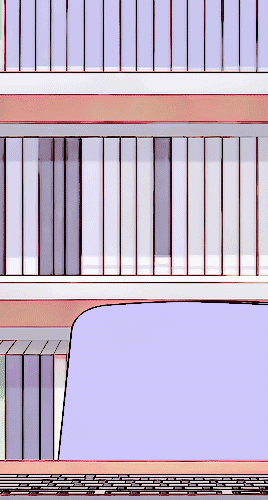
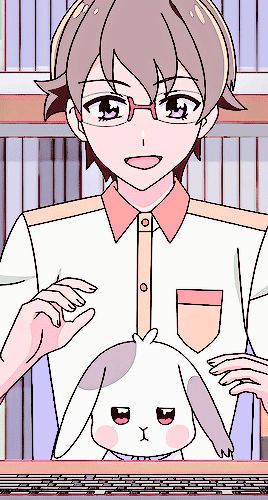
#precure#wonderful precure#toyama satoru#toyama daifuku#mygifs#struggle coloring i have not yet found my rhythm with wonderful which is why i haven't been giffing it but i wanted this lol#every time daifuku shows up i'm so happy 🥹 i love that little • ˕ • face#edit: fixed the speed i was so focused on the coloring i forgot to retime it oops
389 notes
·
View notes
Text
Kaladin Didn’t Invent Therapy (And Why That’s Actually Great)
“...You need someone to talk to, Noril, when the darkness is strong. Someone to remind you the world hasn’t always been this way; that it won’t always be this way.”
“How do you … know this?” Noril asked.
“I’ve felt it,” Kaladin said. “Feel it most days.”
- Rhythm of War, Ch. 25 Devotary of Mercy
I’m writing as someone with a background in psychotherapy and peer support, and I'm bursting with excitement about one of my favourite topics. You can imagine why I love Kaladin’s arc in Rhythm of War so much! I actually yelled out loud when I read some of these parts the first time.
I’ve seen people online saying and making jokes that Kaladin invents therapy, and while that could eventually be true, what Kaladin actually invented in RoW is mental health peer support. Psychotherapy as most people would understand it simply doesn’t exist yet on Roshar. However, peer support is a legitimate modality for healing on its own merits. Even more importantly for the story, peer support is something Kaladin would personally really benefit from, and it fits his narrative arc way better than therapy would.
1. Therapy as we know it won’t exist for a while yet.
“We need to study their responses, use an empirical approach to treatment instead of just assuming someone who has suffered mental trauma is permanently broken.”
- Rhythm of War, Ch. 25 Devotary of Mercy
“Someone needs to talk to them, try different treatments, see what they think works. What actually helps.”
- Rhythm of War, Ch. 25 Devotary of Mercy
Obviously, Kaladin has not been educated in battle shock or melancholia or any other diagnosis. In Alethkar there's hardly any knowledge to be had on the subject. Even now in real life, research into effective interventions for various diagnoses is still ongoing, over 100 years after modern therapy was founded.
Building an empirical knowledge base* will take time, not to mention the years it will take to train new therapists across Roshar in how to provide interventions specific to various issues. Therapy as we know it today generally includes time in mentorship with another therapist, so in a way, the first therapist isn't a therapist. 😅 In the meantime, there are people who need help today, including Kaladin.
Peer support can fill that gap because its knowledge base is different. Peers bring their expertise, which is their years of trial and error, successes and failures - their lived experience. Peer facilitators need to know the basics of managing a group, and they have to be willing to share their own experiences and learn from the group. Thus, training peer leaders is relatively quick, and incredibly scalable and adaptable across cultures and many issues/diagnoses.
2. Peer Support is a distinct path to recovery that doesn’t require an expert in therapy.
Kaladin located six men in the sanitarium with similar symptoms. He released them and got them working to support each other. He developed a plan, and showed them how to share in ways that would help...Today they sat in seats on the balcony outside his clinic. Warmed by mugs of tea, they talked. About their lives. The people they’d lost. The darkness.
- Rhythm of War, Ch. 33 Understanding
“While you can’t force it, having someone to talk to usually helps. You should be letting him meet with others who feel like he does.”
- Rhythm of War, Ch. 25, Devotary of Mercy
Kaladin is already positioning himself to align with the values of peer support. Some of these values overlap with therapy, such as dignity, respect, inclusion, hope, and trust. What makes peer support different is a particular emphasis on equal relationships, self-determination, and personal growth (Peer Support Canada, 2022).
In peer support, the group facilitator is not considered an authority like a therapist would be. A peer leader may be further on the road to recovery, but they may not be. They are expected to listen and grow just like any other group member.
Because the leader of the group is also a learner, peer support groups tend to be more collaborative and open-ended. Everyone in the group has something they can take out of it and something to give. Everyone in the group is responsible for managing their own self care, and everyone in the group is responsible for the direction of their own growth. This is different from most therapy groups, which often have a specific focus or goal that the therapist is responsible for implementing. And speaking of responsibility...
3. Peer Support Fits Kaladin’s Narrative Arc Better than Therapy
At his father’s recommendation—then insistence—Kaladin took it slowly, confining his initial efforts to men who shared similar symptoms. Battle fatigue, nightmares, persistent melancholy, suicidal tendencies.
-Rhythm of War, Ch. 33 Understanding
…he’d learned—these last few months—that his battle shock could take many forms. He was getting to where he could confront it.
-Rhythm of War, Ch. 39 Invasion
I think everyone can agree that Kaladin needs to participate in therapy just as much as the other battle-shocked men he finds in the Devotary of Mercy.
However, in therapy, the focus is solely on the needs of the clients. A therapist should not be distracted by their own issues (when this happens, it’s called countertransference). Further, therapy is generally framed such that the therapist is the only expert in the room, which means therapists have a higher level of responsibility for how the clients are doing (which varies depending on the issue, the therapy modality, and the circumstances).
In his own recovery, Kaladin is working on trying to take less responsibility for others, so setting him up as a therapeutic authority could be harmful for him. In a position of authority, he might be tempted to replicate the hierarchical structure he was in before (which would impede his own growth), or try to save everyone (which could impede everyone's growth). He simply doesn’t have the mentorship or knowledge base he'd need to work through those issues before leading as an expert.
In contrast, the point of peer support is the mutual sharing of lived experience. The group facilitator is expected to share their own struggles (as a model of recovery), and allow others to support them. In the context of a more balanced power dynamic, Kaladin can give the other group members the space they need to grow, and he can pursue his own recovery without feeling like he’s letting others down. Also, he will be able to leave the group during KOWT without worrying that the group won't be able to run without him. Everyone in the group carries some responsibility for each other, so group members can come and go with less stress than a change in therapist would cause in group therapy.
This is the beauty of peer support. It can happen anywhere people with similar experiences get together. No formal education is required. What is required is a willingness to know yourself as well as you can; to share your experiences; to listen to others tell their stories; to question your own assumptions as you learn how others handle things differently; to look out for each other's safety; to care.
Peer support creates a place of belonging and a community repository of shared wisdom. Kaladin almost had it on Bridge Four, but his position of authority wouldn’t allow him to grow the way he needed. Peer support is what Kaladin needs - he needs a place where he can take off his armour among people who get it because they're struggling with similar issues, and without having a position of responsibility over them. When he (eventually**) attends the groups, they help him grow!
Anyway, that's why Kaladin didn’t invent therapy, and why I think that's great.
For the men chatting together softly, the change was in being shown sunlight again. In being reminded that the darkness did pass. But perhaps most important, the change was in not merely knowing that you weren’t alone—but in feeling it. Realizing that no matter how isolated you thought you were, no matter how often your brain told you terrible things, there were others who understood.
- Rhythm of War, Ch. 33 Understanding
---
*Funny enough, empirical research could lead Rosharan researchers right back to peer support. Empirical research on Earth has shown that modern therapy and peer support have similar levels of effectiveness (for example, for depression and PTSD).
**Look who’s resisting attending the groups he founded…KALADIN!! (shakes fist in the general direction of the sky) (This is the most relatable passage for me in this whole book, by the way, helper types unite lmao):
Kaladin looked down at the table. Had it? Had talking to Noril helped?
“He’s been avoiding joining in,” Teft said.
“I haven’t,” Kaladin snapped. “I’ve been busy.”
Teft gave him a flat stare. Storming sergeants. They always heard the things you weren’t saying.
- Rhythm of War, Ch. 38 Rhythm of the Terrors
Peer Support Canada. (2022). Peer Support Core Values. Accessed from https://peersupportcanada.ca/ Jun 27, 2022.
#I shared this on reddit a while ago but it got archived so here#enjoy#this is not an april fools thing this is just bad timing on my part#kaladin stormblessed#rhythm of war#row spoilers#kaladin didn't invent therapy#peer support#stormlight archive#the stormlight archive#stormlight essay#stormlight meta#god i love kaladin so much
155 notes
·
View notes
Text
Man.....I love when mashups go places I dont expect
#rhythm heaven#mashup#zedd#mlp#monkey watch#man i love monkey watch#i love accidentally being thrust into fandoms i was in ten years ago as well
2K notes
·
View notes
Text


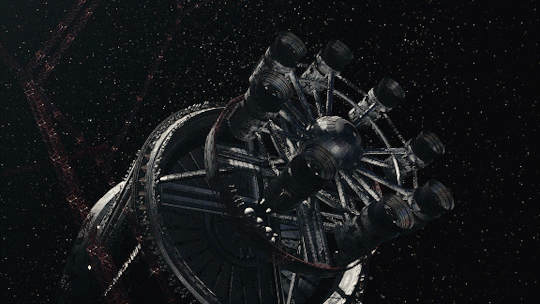
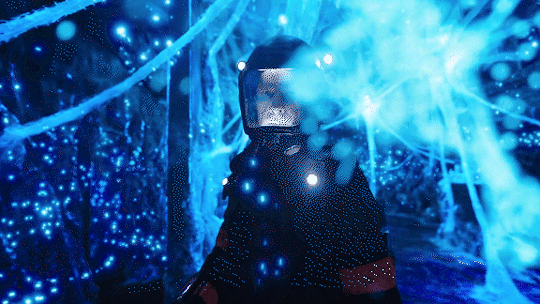
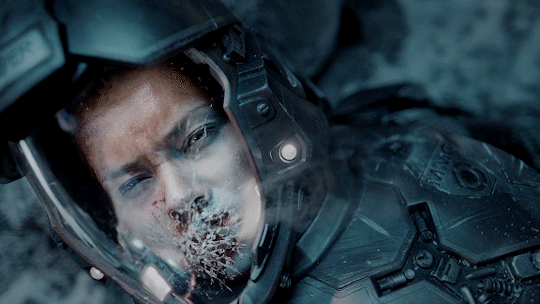
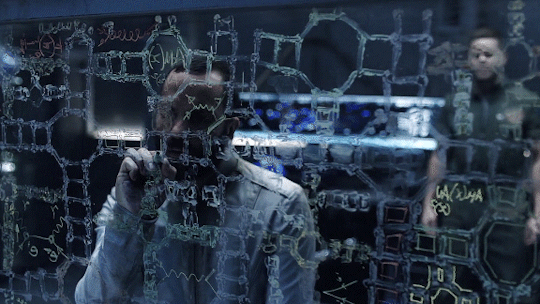


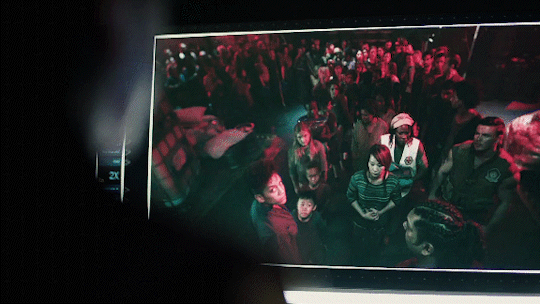
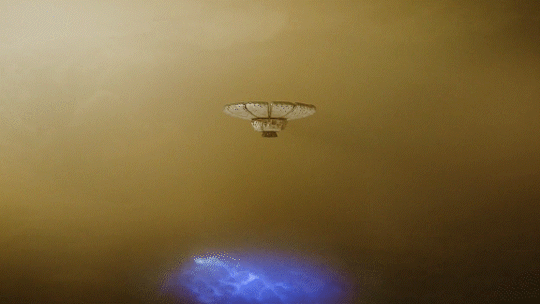
The Expanse | Season 2 (2017), Mark Fergus and Hawk Ostby
#the expanse#theexpanseedit#what. a. season.#wow#i was so sure that most of this stuff happened later?#but anyway season 1 was beautiful but of course it was establishing a lot#and season 2 is just so packed with good stuff but also it feels like they got their rhythm#beautiful beautiful show#i love everyone in this bar#tv 2024#rewatch#i made this#i just want a tag for the things i personally put out into the world
260 notes
·
View notes
Text
look i understand it goes against the themes and motifs of the metanarrative but i would kill for a musical adaptation of goncharov.
#THINK.#THE CLOCK AS A METRONOME#ICE PICK JOE'S VICTIMS JOINING THE TRAGIC CHORUS ONE BY ONE#''WINTER COMES TO NAPLES'' HAS A GOOD RHYTHM ALREADY#jules.txt#goncharov#do you understand how much i want ''of course we're in love. that's why i tried to shoot you#/ if we were really in love you wouldn't have missed'' on stage?#do you understand?
389 notes
·
View notes
Text
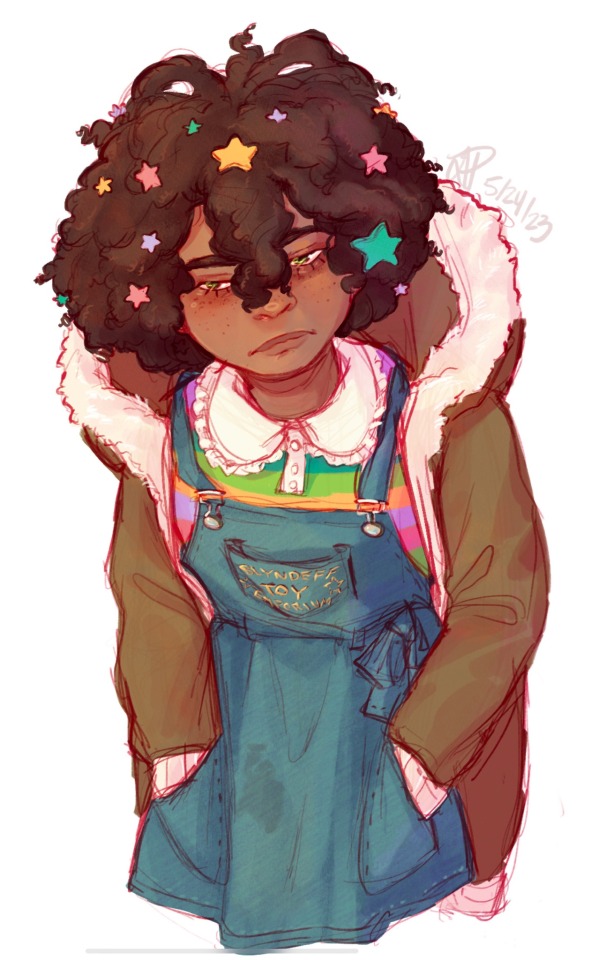
“it’s just a warmup sketch,” i say to myself. “i’m just gonna warm up on shading and coloring. i’m just warming up on anatomy.” my spine crackles from sitting in shrimp stance for 2 hours. “just to warm up.”
#dairydraws#epithet erased#molly blyndeff#prison of plastic#jelloapocalypse#epithet erased prison of plastic#eepop#digital painting#molly is really fun to practice drawing hair on but i do kinda feel like i’m fighting against the skin tone in her ref whenever i draw her#i don’t even necessarily feel like i favor warmer or more saturated tones in general but idk#something about the color in her ref doesn’t mesh right with my painting style#i should try painting her lit in cooler toned light that might help#i was drawing her crying and then changed my mind#but i forgot to erase the little snot bubble. so i guess molly has a runny nose#the reason i got so carried away is almost definitely because the cafe im in is playing such slow relaxing music#i usually listen to pretty upbeat stuff when i draw#and it motivates me to go fairly fast. but i was just kinda enjoying myself and going with the rhythm of the lowfi beatstrumentals#this is a great cafe. the masala chai here fucking shreds#it’s so cardamom heavy and baby do i love cardamom#you know a tea at a cafe is good if drinking the stuff leftover at the bottom gets a lil grit in ur mouth#molly deserves a warm cup of masala chai frankly
970 notes
·
View notes
Note
that one gif of mercy overwatch extending her hand. Cam i have come to save youuuuu
-greg and nessa playing dance dance revolution or the fazbear equivalent at an arcade
-cassie and tony meeting!!
-glam chica in different outfits (i lauvvvvv her........)
-gregory and cassie making comics :3
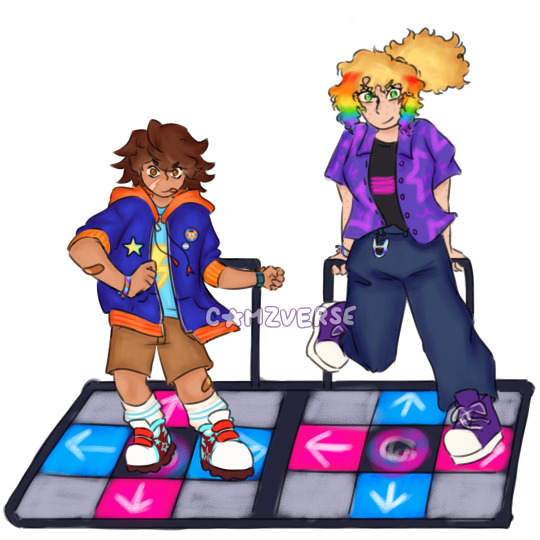
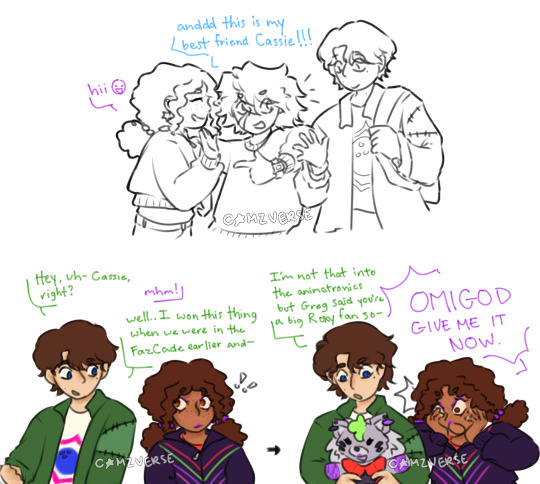
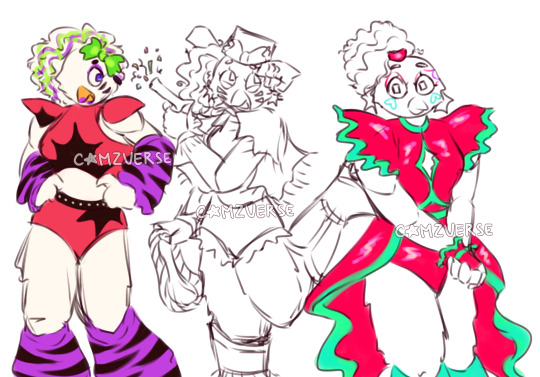
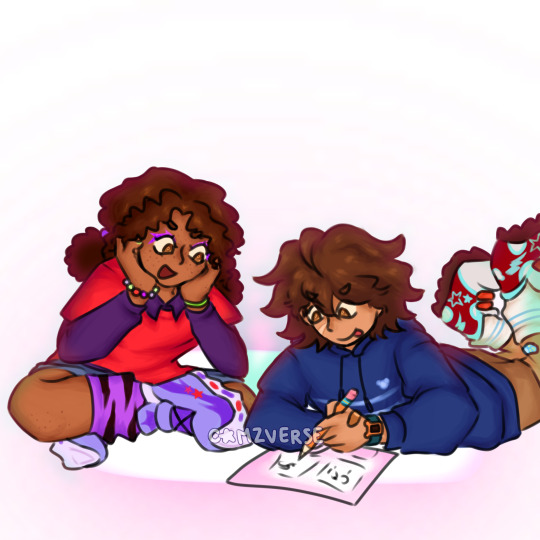
WOOHOOOOO!!1!1!1
#THESE WERE SO SO SUPER DUPER FUN TO DRAW TYSM CAROUSELLLLL#i think vanessa would be soo good at ddr. she is an absolute rhythm game pro To Me#and cassie would come up with a bunch of fun little story ideas and gregory would execute them perfectly#bc like they just get each other so wellll. The bffs ever#also also glam chica savee meeeee I LOVED DRAWING HER shes so cool i love her so dearly#cam.art#fnaf#fnaf gregory#fnaf vanessa#tony becker#superstar duo#fnaf cassie#fnaf security breach#fnaf ruin#fnaf tftp#glamrock chica
112 notes
·
View notes
Video
The ending screen for TanTan TEO, the fin fin rhythm game!
#finfin#fin fin#tantan teo#tan tan teo#fin fin on teo the magic planet#fin fin teo#no one ever talks about the rhythm game anymore#thats because it is not good but i enjoy it so much#why are there two that is not fin fin jr nor his wife#this ending is kinda scary and unnerving but thats why i love it so much#enjoy#finclips#also it was kind of hard to beat
689 notes
·
View notes
Text
The Lullaby Representing True Love
The lullaby we heard in book 7 has such a deep meaning and it gets me emotional.
It’s used in various ways to repeatedly show love between the characters.
We hear Malleus hum this song that Lilia and Meleanor sang to him when he was in his egg. This song Malleus hums as he puts everyone into a comforting sleep where they can have their happiest dreams.
This song we heard Meleanor sing to eggleus right before she gives her egg away, a final lullaby of love and comfort. Her farewell to Malleus.
The lullaby we hear Lilia sing to Silver in the flashback, something to calm him. Showing him love through a song that means much to him and showing his love for Silver.
Malleus then hums this very song to Silver as well. He doesn’t know where he heard it but he remembers it fondly. He knows it brings comfort so he hums it to baby Silver and we see how Malleus continues to go on and love that baby.
Then we hear this same melody when Silver accepts the love Lilia has for him. It’s in the background. Silver literally states that his father loves him. You can hear it start from the fight with sebek and then the melody increase as Silver accepts that truth of how much he is loved. We see the Knight of Dawn happy to see his son happy again.
We hear Lilia sing it to eggleus. He’s looking for a way to hatch Malleus. Makes him all these promises. Constantly compliments and teases him. And then Lilia, general lilia, sings it to him. Showing him that love and care that he has for him. Malleus flickers in response. Then we get Malleus hatching in the next scene.
And the last scene we hear the Rhythm is with Silver and Lilia. When we see Silver tell Lilia that he wants to talk with him and Lilia agrees. We hear it loud and clear the love and comfort between the two.
The lullaby is literally true love in a song. The way they constantly show true love these characters have for each other gives me awe.
I hope we get this song in a twsttunes. I can’t wait to see how this song will be used again. The way they incorporate the lyrics or the rhythm into the story to show true love just has me feral.
#ahhhh I was doing research for a baby malleus post and was hit in the feels 😭😭#please the way this books just gets me so emotional#I hope we see more scenes with this rhythm#more scenes with malleus having it in the background maybe when his ob is over#dia or lilia can sing it to him#show how loved he is#dia singing it to lilia to show their love for him#a ending twsttunes where they dance and it plays in the background#please#lilia vanrouge#malleus draconia#twst silver#sebek zigvolt#twst analysis#twst character analysis#diasomnia#twst book 7#Hana queues#Disney twisted wonderland#twisted wonderland
219 notes
·
View notes
Text

ryojoe as the rhythm heaven fever double date guys :)
307 notes
·
View notes